

Aldo Colucciello
Anthropologist, involved on B.R.I.O. Association activities
Intimalente - Home. Levi-Strauss C. Ethnic recipes. GALLERY. Audiolibri. Governement. India. India wedding. Philosophy. Activist/Engaged Anthropology. Association B.R.I.O. - Our Initiatives. File .doc for regirstration.
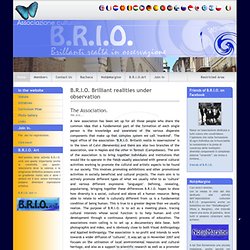
Click here! Nell’ambito delle attività B.R.I.O. avrà uno spazio importante anche la creatività, uno spazio-laboratorio dove la valenza e la pregnanza simbolica possano avere un gradiente molto alto e dove i simboli ed il loro valore intrinseco possano diventare espressione artistica. ANU - Research School of Humanities & the Arts - RSHA. Selected Publications: Books and Monographs The Corporeal Image: Film, Ethnography, and the Senses.
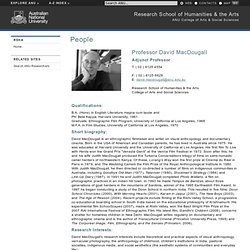
Princeton, NJ: Princeton University Press. Transcultural Cinema. Selected essays, edited by Lucien Taylor. 1995 Conversations with Anthropological Film-Makers: David MacDougall. Levi-Strauss C. ANTHROPOLOGIE. Estudios visuales. Art + Anthropology. OPEN ANTHROPOLOGY PROJECT. Rethinking visual anthropology. Intimalente - Home.
Visual Anthropology. ANU - Research School of Humanities & the Arts - RSHA. Associazione B.R.I.O. - Home. Open Education. Cognitive Media. Brain Food. Journal. Camaron por sevillanas de saura. Flamenco arabe....gipsy200. The corrs and the chieftains. Lole Y Manuel - Tu mira. Mapping & Cartography. Atlas. GeoVis Tools. Historical Photography. Photography/Art. Photography. Photography. GALLERY. Ethnography. Digital Ethnography. Ethnic/Regional.
Ethnic Music. Associazione B.R.I.O. - Home. Social Network Analysis. Intimalente - Home. Chinas Ethnic Groups. Ethnic recipes. Films. 100 Greatest Movie Directors. Guardian.co.uk Film. East Asian cinema. East Asian cinema is cinema produced in East Asia or produced by people from this region.
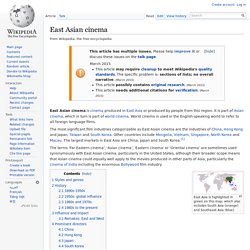
It is part of Asian cinema, which in turn is part of world cinema. World cinema is used in the English-speaking world to refer to all foreign language films. The most significant film industries categorizable as East Asian cinema are the industries of China, Hong Kong and Japan, Taiwan and South Korea. Other countries include Mongolia, Vietnam, Singapore, North Korea and Macau. The largest markets in East Asia are China, Japan and South Korea.[1] The terms 'Far Eastern cinema', 'Asian cinema', 'Eastern cinema' or 'Oriental cinema' are sometimes used synonymously with East Asian cinema, particularly in the United States, although their broader scope means that Asian cinema could equally well apply to the movies produced in other parts of Asia, particularly the cinema of India including the enormous Bollywood film industry.
Ang Lee. Ang Lee OBS(Chinese: 李安; pinyin: Lǐ Ān; born October 23, 1954) is a Taiwanese-born American film director, screenwriter and producer.[1][2] Early life[edit] Childhood and education[edit] "I was never a citizen of any particular place...
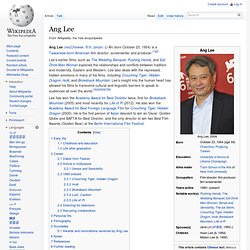
My parents left China to go to Taiwan. We were outsiders there. Lee studied in the Provincial Tainan First Senior High School (now National Tainan First Senior High School) where his father was the principal. After finishing Taiwan's mandatory military service, Lee went to the US in 1979 to study at the University of Illinois at Urbana-Champaign, where he completed his bachelor's degree in theater in 1980. During graduate school, Lee finished a 16mm short film, Shades of the Lake (1982), which won the Best Drama Award in Short Film in Taiwan. Life after graduation[edit] Lee's NYU thesis drew attention from the William Morris Agency, the famous talent and literary agency that later represented Lee.
Hayao Miyazaki. Japanese animator, film director, and mangaka Hayao Miyazaki (宮崎 駿, Miyazaki Hayao, [mijaꜜzaki hajaꜜo]; born 5 January 1941) is a Japanese animator, director, producer, screenwriter, author, and manga artist.
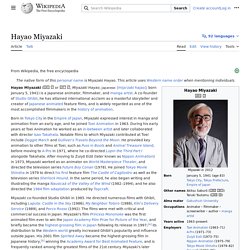
A co-founder of Studio Ghibli, he has attained international acclaim as a masterful storyteller and creator of animated feature films, and is widely regarded as one of the most accomplished filmmakers in the history of animation. Miyazaki's works are characterized by the recurrence of themes such as humanity's relationship with nature and technology, the wholesomeness of natural and traditional patterns of living, the importance of art and craftsmanship, and the difficulty of maintaining a pacifist ethic in a violent world.
The protagonists of his films are often strong girls or young women, and several of his films present morally ambiguous antagonists with redeeming qualities. Early life[edit] Several characters from Miyazaki's films were inspired by his mother Yoshiko. Akira Kurosawa. Chan-wook Park. Wong Kar-wai. Mira Nair. Mira Nair (born 15 October 1957) is an Indian film director, actress and producer based in New York.[1] Her production company is Mirabai Films.
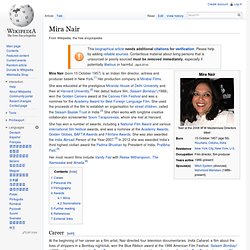
She was educated at the prestigious Miranda House of Delhi University and then at Harvard University.[2] Her debut feature film, Salaam Bombay! (1988), won the Golden Camera award at the Cannes Film Festival and was a nominee for the Academy Award for Best Foreign Language Film. She used the proceeds of the film to establish an organisation for street children, called the Salaam Baalak Trust in India.[3] She often works with longtime creative collaborator screenwriter Sooni Taraporevala, whom she met at Harvard.
Zhang Yimou. Zhang has won numerous awards and recognitions, with Best Foreign Film nominations for Ju Dou in 1990 and Raise the Red Lantern in 1991, Silver Lion and Golden Lion prizes at the Venice Film Festival, Grand Jury Prize at the Cannes Film Festival, and the Golden Bear at the Berlin International Film Festival.[5] In 1993, he was a member of the jury at the 43rd Berlin International Film Festival.[6] Zhang directed the opening and closing ceremonies of the 2008 Beijing Summer Olympic Games, which received considerable international acclaim.
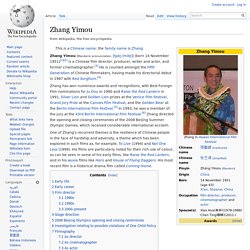
§Early life[edit] Zhang was born in Xi'an, the capital of Shaanxi province. Zhang's father, a dermatologist, had been an officer in the National Revolutionary Army under Chiang Kai-shek during the Chinese Civil War, an uncle, and an elder brother had followed the Nationalist forces to Taiwan after their 1949 defeat. As a result, Zhang faced difficulties in his early life.[7][8]